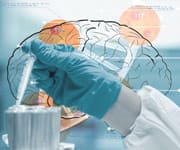Life Extension Magazine®

Renowned neuropsychiatrist and best-selling author Dr. Daniel Amen has written his first book specifically addressing the female brain. He gives a comprehensive and much-needed guide to understanding a woman’s unique brain and its strengths (intuition, empathy, multitasking, collaborating) and vulnerabilities (anxiety, depression, a tendency to worry). In the pages of Unleash the Power of the Female Brain, Dr. Amen discusses strategies women can use for peak brain performance, including what supplements to take, how to balance their hormones, and what lifestyle changes may lead to increased brain health.
LE: While there is an enormous amount of information in your book about how women can improve their brains, you mention some specific laboratory tests that women should get and monitor, including a vitamin D blood test and a homocysteine blood test. Why are they so important?
Dr. Amen: Low levels of vitamin D have been associated with obesity, depression, cognitive impairment, heart disease, reduced immunity, cancer, psychosis, and all causes of mortality. Two-thirds of the population is low in vitamin D; this is the same percentage of US residents who are overweight or obese.
LE: What about homocysteine?
Dr. Amen: Elevated homocysteine levels in the blood have been associated with damage to the lining of the arteries and atherosclerosis as well as an increased risk of heart attack, stroke, blood clot formation, and possibly Alzheimer’s disease. This is a sensitive marker for B vitamin deficiency, including folic acid deficiency. Replacing these vitamins often helps return the homocysteine level to normal.
LE: One of the chapters in your book is titled, “Balance Your Hormones to Boost the Female Brain.” What is the relationship between hormone levels and brain function?
Dr. Amen: There is a very strong mutual influence between hormones and the brain. The brain produces signals that trigger hormones, and hormones from other parts of the body also influence the brain. For example, when thyroid activity is low, brain activity is typically low as well. That’s why a low thyroid often goes along with depression, irritability, and brain fog. Balanced hormones are critical to your brain’s well-being.
LE: While there are several hundred hormones that affect the brain, you mention about a half-dozen that are the most important. Namely estrogen, progesterone, testosterone, thyroid, cortisol, DHEA, and insulin. However, you spend a lot of time on estrogen. What makes estrogen so critical?
Dr. Amen: Healthy levels of estrogen make you feel good. Too much estrogen can make you feel anxious and irritable. Estrogen withdrawal makes you feel anxious and confused. It’s the rise and drop in estrogen that drastically affects your mood, and the more erratic your particular fluctuation is, the more upset it can make you. These problems become worse during perimenopause and menopause, when estrogen levels wane.
LE: What are the symptoms of excess estrogen levels?
Dr. Amen: Puffiness, heavy bleeding, fibrocystic breasts, low libido, cravings for carbohydrates, weight gain around the hips, vaginal or oral yeast, mood swings, tender breasts, and headaches or migraines.
LE: And what are some symptoms of low estrogen levels?
Dr. Amen: Weight gain, bladder incontinence and infection, mood changes or depression, insomnia, low libido, heart palpitations, osteoporosis, painful intercourse, foggy-headedness, irritability, fatigue, weepiness, hot flashes, and pain.
LE: Fortunately, you mention some foods that can help improve the conversion of estrogen into good metabolites, or metabolites that can easily be excreted. What are they?
Dr. Amen: There are great foods that can help improve the conversion of estrogen into good metabolites away from bad ones. These foods include insoluble dietary fibers, such as lignans found in green beans, peas, carrots, seeds, and Brazil nuts. The reason that dietary fiber, especially lignans so beneficial is that it can bind harmful estrogens into the digestive tract, so they can be excreted in the feces instead of being reabsorbed. Dietary fiber also improves the composition of intestinal bacteria so that harmful estrogen metabolites can be excreted from the body.
LE: And can you quickly explain why sugar and simple carbohydrates are so detrimental to brain health and overall health?
Dr. Amen: Sugar and simple carbohydrates cause unfriendly flora to grow in the gastrointestinal tract and disrupt estrogen metabolism. These foods also raise blood sugar and insulin levels, resulting in adverse influences in sex hormone balance. Too many simple carbohydrates have been associated with postmenopausal breast cancer risk among overweight women and women with a large waist circumference.
LE: There are some dietary supplements that you recommend women begin taking to improve their estrogen imbalance, including omega-3 fatty acids and melatonin. How are they beneficial?

Dr. Amen: Omega-3 fatty acids contain EPA, which has been reported in laboratory studies to help control estrogen metabolism and decrease the risk of breast cancer. Eating grass-fed organic beef also supplies these fats. Melatonin levels decline with age and may lead to sleep disturbances common during menopause. Melatonin has been shown in laboratory studies to inhibit the growth of breast cancer cells. It also acts as an anti-inflammatory and antioxidant in the brain and other tissues like the intestine.
LE: You discuss a lot of instances where hormones affect overall mood. In particular, you state that low progesterone can lead to a host of unsettling symptoms for women. Can you expand on that a bit?
Dr. Amen: Progesterone can fluctuate greatly in women who are in their late thirties and forties, making them feel anxious and irritable. Often, progesterone cream can be very helpful under the care of an experienced health care provider.
LE: What are some things that produce low levels of progesterone?
Dr. Amen: Progesterone production can decrease with low levels of thyroid hormone, the use of antidepressants, chronic stress, deficiencies in the vitamins A, B6, C, or zinc, and a diet high in refined sugar. Chasteberry has been found to help support healthy progesterone levels. It can also be taken to reduce the symptoms of PMS and endometriosis (20-40 mg a day).
LE: Low levels of DHEA can also wreak havoc on a woman’s system. Why is that?
Dr. Amen: One of the most important reasons to measure DHEA is that low levels in combination with high cortisol levels put you at risk for memory loss. Originally, it was thought that high cortisol was the culprit in damaging the hippocampus, the brain’s major learning and memory center, but new studies report that people with Alzheimer’s have lower DHEA levels. When DHEA drops, the protective effects of DHEA on the brain are lost.
LE: How can women combat this problem?
Dr. Amen: If your DHEA is low, it can easily be supplemented. There is good evidence that validates DHEA supplementation to help support adrenal gland function and your weight. DHEA is usually well-tolerated, but there can be some unpleasant side effects like acne and facial hair owing to the tendency of DHEA to increase testosterone levels. These can be avoided by using a specific metabolite of DHEA called 7-Keto-DHEA.
LE: Are there any other supplements that might be helpful to the adrenal system?
Dr. Amen: B vitamins support the adrenal system and can help you deal with stress. 5-HTP is a calming supplement that boosts serotonin levels and can support sleep so that you feel less stress, which can also help with weight loss. Also, L-theanine, Relora, magnesium, holy basil, ashwagandha, and rhodiola have been shown to be useful.
LE: In addition to supplements that can support hormone levels and protect the brain, you have a section in the book titled “Amen Clinics’ Nine Rules of Brain-Healthy Eating.” People should absolutely buy the book for the complete list of rules, but you mention a few specific foods that readers may find are interesting in terms of how much benefit they offer. Hemp seeds and raw cacao come to mind. Why are they so beneficial?
Dr. Amen: Raw cacao is loaded with antioxidants and is high in flavonoids, which are substances shown to increase blood flow, magnesium, iron, chromium, zinc, copper, and fiber. It can also decrease cravings and balance blood sugar. But eat only a small amount of dark chocolate or it will turn to fat.
LE: And what about hemp seeds?
Dr. Amen: Hemp seeds are high in protein, contain all essential amino acids and fatty acids, and are high in omega-3s and healthy omega-6s (including gamma-linolenic acid, which has anti-inflammatory properties).
LE: From what foods to eat, to what supplements to take, to stress-relieving strategies and hormone balancing advice, Unleash the Power of the Female Brain is a must-read for women of all ages. Thank you.
Daniel G. Amen, MD, is a physician, double-board-certified psychiatrist, teacher, and eight-time New York Times best-selling author. He is
widely regarded as one of the world’s foremost experts on applying brain imaging science to everyday clinical practice.
Dr. Amen is the founder of Amen Clinics in Newport Beach and San Francisco, California; Bellevue, Washington; Reston, Virginia;
Atlanta, Georgia; and New York City.
If you have any questions on the scientific content of this article, please call a Life Extension® Wellness Specialist at 1-866-864-3027.

